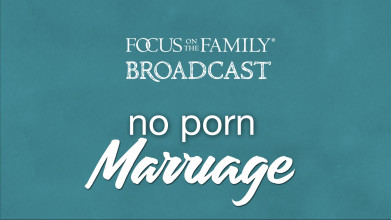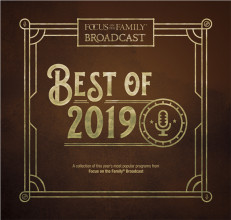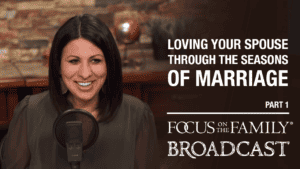
Engaging Hearts and Minds in a Broken Culture
This discussion offers a preview of Volume #16 “Cultures in Conflict” from the That The World May Know video series, available below.
Home » Episodes » Focus on the Family Broadcast » Discovering God’s Freedom From Pornography (Part 1 of 2)
In this Best of 2019 broadcast, Nick Stumbo and his wife, Michelle, describe how their marriage has been restored after he found freedom from a long-time addiction to pornography and the overwhelming guilt and shame that accompanied it. They offer encouragement and hope to troubled couples who are struggling with the impact of pornography and infidelity on their marriage. (Part 1 of 2)
Teaser:
Man #1: Just because I look at certain magazines or websites doesn’t mean I don’t love my wife. Just a little bit here and there helps me relax.
Man #2: What’s the big deal? I’m not hurting anyone, and it’s legal, isn’t it? At least I’m not an addict like other guys I know . . .
Woman: I know men are more visual. And maybe they can’t help themselves. But it makes me feel sick and dirty inside.
Man #3: No matter how hard I try, I can’t look away. And every time I promise I won’t look again . . . [Sigh]
End of Teaser
John Fuller: Well if those comments reflect any part of your own personal experience with pornography we urge you to keep listening to this “Best of” edition of Focus on the Family.
We’re returning to a powerful story from earlier this year that generated a lot of response from listeners like you.
And of course, this is a sensitive topic and it’s not appropriate for younger listeners.
Your host is Focus president and author, Jim Daly. And I’m John Fuller.
Jim Daly: Pornography is one of the hardest topics we address on this broadcast, John. And I know people will want to write us or send an email to let us know how inappropriate it is. But it’s not. That’s one of the problems. You know, God has given us this incredible gift of sexuality meant for the context of marriage. In the world, and within the church, we’ve so mishandled it that it has created chaos in families. It has broken families apart.
And I think that is the core reason I want to come back to it from time to time – to teach our kids, particularly, and to equip parents to teach kids how to think of sexuality in a great way, as God’s wedding gift to us. And I’m determined to do it.
So, I know that some of you might be offended by this. Please open your heart up to the discussion, what God has intended for good. Don’t shut down. That is exactly, I think, in part why the church is in the mess that it’s in because we’re not open about this discussion. And we want to keep it behind closed doors. It’s OK. Man, the Bible is full of sexual stories that went awry. So, let’s do it the God way and do it in a healthy way. And that’s the purpose for the program today.
John: And if this is a struggle for you, let us just tell you right now we have caring Christian counselors that can walk through how to bring this issue into the light and how to find some steps on a recovery journey. Um, our number is 800, the letter A and the word FAMILY. 800-232-6459.
Jim: As I think about it, you know, during the last Super Bowl I remember watching with my boys. And I found myself scrambling for the remote every time those commercials came on. Our culture has become so saturated with sexuality. And when you’re raising kids, boys or girls, you can’t shield them from everything. That’s why we need to teach them, especially as teenagers, about how to navigate their sexuality, and pornography and every other magnet attraction that goes right to the core of their nature as sinners.
I’m so glad we’re coming back to this Best of 2019 broadcast with Nick and Michelle Stumbo. It’s really solid stuff that will equip you to deal with these issues in your own life and in the lives of your family.
John: Nick Stumbo is the executive director of Pure Desire Ministries, which is a parachurch organization helping provide hope, freedom, and healing for those dealing with sexual brokenness. And together Nick and Michelle lead group sessions for men and women who are pursuing sexual health and purity. They share their story of working through these issues in their own marriage, often, as we’re about to hear. Nick has written a book called Setting Us Free: An Unexpected Journey Of Grace. And you can get your copy at focusonthefamily.com/broadcast.
Here now, Nick and Michelle Stumbo on this Best of 2019 episode of Focus on the Family.
Jim: I know this is a very difficult subject. But you are so open about it. I think a lot of people are going to be helped and hopefully healed from some of the, you know, the things that they’re dealing with…
Nick: Yeah, we hope so.
Jim: …So thank you for that transparency.
Nick: Yeah.
Jim: Nick, I’m going to start with you and go through a few questions. And then we’re – Michelle, I’m going to get you in there pretty quickly. But you grew up in a godly Christian home. I mean, you are going to be the, kind of, the terror of all of us Christian parents who think we did the formula correctly. But describe that. Your dad and grandfather were pastors. You became a pastor yourself. And then that addiction took over, of pornography, for, like, 17 years.
Where did it start for you? What was the shame factor? Just give us a picture.
Nick: Yeah, my family is, I think, very typical of what we see in Christian homes. When we do events around the country with Pure Desire, we’ll routinely ask, you know, “How many of you grew up in a home that discussed sexual things or sexuality in an open and honest way?” And routinely, only 2 to 3 percent of the audience will raise their hands.
So, the vast majority of us are growing up in very spiritual, godly homes that have disconnected from our sexuality and don’t know how to handle it. And so, I learned at a very young age that anything sexual was secretive. And because of that, it felt shameful. That there was this sense the church taught me, um, sex is only for marriage, and anything outside of that is wrong. And I knew that message clearly. But when things started to enter into my life that were of a sexual nature, you know, being at a friend’s house and being shown things or on a bus at, you know, sporting trips, that sort of thing, your immediate reaction is, well, this isn’t something safe to share with my parents. I need to figure it out alone. And so, I just entered into that struggle of never wanting to do it. You know, I didn’t ever live a double life – right? – of the secret stash that I was just trying to keep from people.
In my life every time – and I think this is common for Christian men – every time was going to be the last time. Never again, I don’t need it. I don’t want it. And yet, there are systems being established in your brain and in your thinking, um, and how you’re dealing with life that just continue to take you back.
Jim: Yeah, you know, to paint the scope of this, there’s some data that you had in your book. Just give us some of the statistics that paint a picture for us about the depth and the width of this.
Nick: Yeah. We have been doing research through Pure Desire for a number of years. And we use something called the Sexual Addiction Screening Test to just kind of gauge a person’s level of struggle. And through years of this reporting, we found that 68 percent of men are struggling with sexually compulsive behavior.
Jim: Sixty-eight percent of men!
Nick: Yeah, and that number, I think, seems high to us because we – we dismiss or minimize a lot of these things. Just like I said earlier in my story, if a man is saying, “Oh, that was the last time, it’ll never happen again,” we don’t think of ourselves as having a struggle. But when a real black-and-white, yes-no question says have you ever, you know, struggled with something that felt shameful, and that’s a yes, that’s indicative of a problem. And then we also find that 25 to 30 percent of Christian women have sexual dependency issues of their own of some kind. Now, that might be more of a love addiction, a relationship addiction. Or it could be struggles of their own with pornography because it’s not just a man’s issue. You know, it’s men and women. In fact, the fastest growing demographic of pornography consumption is college-age women.
Jim: That’s amazing.
Nick: And I think in our society that that’s actually a reaction to what’s happening among college-age men — that college-age women feel the need to find out, well, what’s going on, what do I need to be to attract a guy and to get him to like me. And so, they enter into it almost out of curiosity and then become hooked in their own ways.
Jim: That 68 percent is within the church. Is that correct?
Nick: Yes. Yup.
Jim: I mean, again, that’s even more breathtaking, that it’s not a secular data point. And that means we have a problem within the community.
As you counsel men and women dealing with this kind of sexual brokenness, how is that women’s addiction? I mean, you describe it as wanting to understand men. Is it that simple? Or are more and more women exploring that as a means for satisfaction, for self-gratification?
Nick: Yeah, well, at its root, any addictive behavior really is a coping mechanism in our lives, whether it’s food or drugs or alcohol or something sexual, like pornography. That the root issue is we’re looking for a way to medicate pain or to deal with intense emotions, like failure and rejection. So, for men or women that can be what drives it to us. And I’m… I think for women, the curiosity of what are men looking at might be where it starts. Just like for a teenage boy, it’s probably not medicating their pain that starts them into pornography. It’s that they’ve got hormones, and there’s access to it. And so, they see these images that capture their thoughts and imagination.
And then it gets fused to a way of dealing with the unpleasant, negative emotions of life because in those moments of acting out with pornography, someone can feel all the things they’re not in the rest of their life. They feel wanted and desired and respected and like they’re perfect, that they’re everything they want it to be. And even though it can be followed by an avalanche of guilt and shame, it’s still that draw. So that – that can happen for women just as easily it can be for men.
You know, women tend not to be as visual. And so, it’s still a little less likely. But women have just as many intense negative emotions that they’re trying to deal with as men do. And that sexual outlet can become a reliable place to feel something that really fills up those holes or that sense of emptiness.
Jim: Right. You, in fact, in the book have a comparison with sexual addiction and a caged bird. Describe that because I think it’d be helpful to our listeners.
Nick: Yeah, and I think of a caged bird in the sense that, um, does the caged bird know what’s missing? Because in all aspects, it’s still a bird. It’s – it’s got wings and feathers and a beak. And it breathes. But if it hasn’t experienced what it is to fly and to soar, it may feel like, well, this is just what life is. And when we’ve entered into pornography and any kind of compulsive behavior sexually, we’ve essentially created our own cage because it becomes a really self-replicating system.
And that’s not the choice we were making initially. We weren’t thinking, “Oh, I want to have a destructive behavior that’ll be rooted in my life for years to come.” We just think, “Oh, this looks good, and I’m enticed by it.”
But it really becomes this pattern that is so difficult to break out of. And it can cause us to think that, “Well, this is all there is. This is just the way life is going to be.” And we hear that kind of language, unfortunately, even in the church. You know, “Boys will be boys. All men struggle with this.” Kind of this dismissive, minimizing attitude of, “Well, that’s kind of the best we can do with our sexuality in this world, so let’s just kind of make the best of it.” Whereas, as you mentioned at the beginning of the program, God’s plan for us is so beautiful and so wonderful. And if we’re really willing to look into this topic and see what freedom looks like – the kind of freedom and blessing he’s designed for our sexuality – it’s so much better than the cheap knockoff version the world gives us. And so that’s the imagery of a cage, that we’re kind of settling for the cage we’re in, not realizing that we have the key to open the door and fly out. But we’ve become too comfortable, um, in the cage.
Jim: You know, that applies across the culture. The least common denominator seems to be what human beings are aiming for, rather than something beautiful, something grand. And it’s so unfortunate because that is God’s plan …
Nick: Yeah.
Jim: …Michelle, I want to get you in here. I know (Laughter) you’ve sitting patiently there listening to this. But um… You guys met. Um, you have this background, Nick, that you’ve been struggling, probably for a few years, with this. What age did you meet and start dating?
Michelle: We met in college.
Jim: Right.
Nick: Yeah, I was a sophomore. She was a freshman.
Jim: OK, so you’d been battling this for a while, though – right? – as a teenage boy, et cetera. So, you met and dated for how long before you got married?
Nick: Almost a full three years, right?
Michelle: Three years, yep, uh-hm.
Jim: Yeah.
Nick: She probably knows the dates better than I do.
Jim: So, did that come up during that time? Did you have an idea, Michelle, that…
Michelle: (Laughter) No.
Jim: …There was a problem, or not really?
Michelle: Well, not till there was a speaker that came through the college and talked about, you know, “Before you get married, you should, like, air your dirty laundry,” so to speak.
Jim: Be open with each other.
Michelle: Yeah, about your past. And then if they, you know, can accept it and move with you, then you’re meant to be together. And if not (laughter)…
Jim: So how did that evening’s conversation go? I mean, that’s pretty bold.
Michelle: …Yeah, we had heard that a chapel service. And so, then Nick invited me out on a coffee date. And I thought we were going for coffee (laughter).
Jim: And what happened?
Michelle: And we never got out of the car (laughter).
Jim: Is that right? I mean, it just – the conversation got going.
Michelle: Yeah, he just, like, I need to tell you something…
Jim: So, you took that literally. And, Nick, you begin to share about your struggle.
Nick: Yeah, well, and it really represented what my Christian upbringing had taught me was the path to freedom, that confess your sins one to another and you will be healed. And so, I had taken that approach with my high school youth pastor and summer camp counselor and college dorm floor assistant. And so, to be honest with my wife just felt like, well, maybe this is one more piece of confession that will kind of open that door, let the light in and I’ll be free. So that was really my motive, was not – not to hurt her, just unload on her. But like, man, if I can be open and honest with her, even before we’re married, I think I can be free of it. So…since I’d already had that pattern of confession in my life, it was like, well, she needs to know. And I tried to, in, you know, just kind of a general overview, explain what I’d battled with and, um, where it was coming from and wanted her to – to know.
Jim: I think that’s admirable. But it is – um, it puts you off balance, Michelle, I’m sure.
Michelle: Very much so.
Jim: I mean, you think you’re going out for coffee with your boyfriend that maybe someday – maybe this is the…
Michelle: Well, actually, we were engaged at the time…
Jim: OK, you’re engaged. I mean, that’s even more so.
Michelle: …Yeah, so we had dated three years and got engaged.
Jim: So, I mean, how did that – how did that hit you? I mean, it had to be destabilizing.
Michelle: Very, yeah. I was – um, I think when I tell women, I’m like, I feel like I was getting punched, like where all the air is kind of, like, knocked out of you.
Jim: Right.
Michelle. When you can’t really breathe.
Nick: I think you said, “I feel like I can’t breathe.”
Michelle: I can’t breathe, yeah. You just don’t know what to do with that information because I was so shocked ’cause he led us in Bible study, he led us in prayer. He was, you know, (laughter) the godly man I had saved myself for. And I was just really shocked, like, that he could struggle with this, but…
Jim: But obviously, it’s interesting to me you didn’t say goodbye.
Michelle: No because I was like, well, I had been told in church also all men struggle with this. And so, it was probably because he wasn’t married, you know? So, all men probably struggle before they’re married. We’re gonna get married. And then…
Jim: Then that appetite will be satisfied.
Michelle: …It’ll fix the problem…
Nick: Everything will be great.
Michelle: …It’ll go away, yeah. I’ll be enough and it’ll go away, yeah. That’s what I was telling myself (laughter).
Jim: OK, yeah, I mean, that’s completely natural. And it also shows your commitment to Nick. I mean, that’s an interesting perspective. But how did you work through – I mean, you obviously said, “I do,” and these things were continuing or were you now hiding them, Nick? What was taking place?
Nick: Yeah, you know, looking back at that night, one of the things that she said – she just asked, “Well, why can’t you promise me you won’t do those things anymore?” And I remember saying to her, you know, this beautiful young woman that I wanted to give my life to, I said, “I feel like I’ve made promises like that to myself and others, and I end up breaking them sooner or later, so I want to promise you that and I’ll do my very best, but I don’t think I can.”
And what scares me looking back as a 21-year-old, I was using the language of addiction. Recognizing there’s a problem in my life, I don’t want it, you don’t want it, but I’m acknowledging I’m not sure I can stop it. And it didn’t even occur to me at the time that that should be a red flag, like, “Hello, this is a significant issue.” And so, we do. We enter into marriage. And for a time, you know, that experience, um, kind of puts at bay other struggles. But somewhere within the first six months, there was a relapse into viewing pornography when I was away at work. And, um, just that guilt and shame of, “How could I be doing this? I have a wonderful wife. Our life of sexual intimacy is great. And yet, I’m still reaching out to this.”
And so, it really showed that there was much more going on than just sex or having some physical need met. That it was connected to other things. But at that time, I was completely blind to it. And so somewhere around that time, you know, had another one of those honest conversations. Like, here we go, I need to confess again because, like I said, I felt if I just would confess enough, sooner or later it would go away. It would be exposed enough that it would be better. And that wasn’t really the experience.
John: Our guests today on Focus on the Family are Nick and Michelle Stumbo. And this is obviously a very serious conversation about a topic that affects so many families. And here at Focus on the Family we want you to know we have help for you if this is a struggle. Our number is 800, the letter A and the word FAMILY. Online, we’re at focusonthefamily.com/broadcast. And we have Nick’s book, Setting Us Free: An Unexpected Journey Of Grace, as well as other resources, including caring Christian counselors who can talk to you if this is a problem for you.
Jim: Let me break in because you said something a moment ago I want to also highlight. What was the need? I mean, from your perspective and your experience, what was driving that compulsion? You alluded to stronger undercurrent forces because your intimacy with Michelle was strong and good and healthy, but something else was going on. What is that something else? For all men and women, what is it in that sexual experience that is driving us to really be disobedient?
Nick: Yeah, well, I want to be careful to say that it’s not just one thing. You’ve got multiple streams that are running together creating, um, a river of that behavior, if you will. So, there is definitely the draw of the images that were designed by God to find beauty in. There’s the chemical response happening in your brain that does create, not only the pleasure at the end, but just the excitement along the way is being reproduced.
Jim: That’s dopamine and other chemical reactions in our brain. It’s a reward system.
Nick: And the more we repeat it, the stronger it becomes and the more easily triggered it is. So, it could start for a guy – like, often for me in those scenarios, it would be being at work, feeling a sense of maybe procrastination, that there’s some hard work to do, I’m not sure how to do it. And with that can come fear of failure or that fear of not being good enough, that I need to perform well to be loved and accepted. And so, we don’t always know what to do with those feelings. And a guy might just describe it, as I probably would in those days – say, “Oh, I was just bored, and then I saw something and, you know, one thing led to another.”
Um, in my story, and I think in so many people’s stories, they never just go to the computer rushing to look for pornography. But it becomes this step by step back to where you’d never intended to go. And so, I – I really see now that in that area of procrastination and the fear of failure or of hard work that I couldn’t do well, it would open me up to something else that was just a convenient escape to start to disassociate from those unwanted feelings. And then the brain finds enjoyment and pleasure in that escape. And then the escape just becomes a slippery slope into the places you promised you’d never go again.
Jim: Yeah. And once again, that Barna Research, 68 percent of Christian men, people going to church, and 25 to 30 percent of women, Christian women, are experiencing this addiction or at least exposure to pornography.
Let’s go to the biblical component of this. And we’re going to come back next time and talk much more. But, um, help us understand the Biblical warning signs about sexual sin. And, you know, we all agree that all sin separates us from God. That’s the core problem. But how is sexual sin perhaps even more harmful than other sin?
Nick: Yeah, you know, sexual sin by its nature is always escalating. Um, it’s really the James 1 passages of, you know, what – what is it that entices you and drags you ways? And it – you know, the lust inside of you that give birth to temptation, and that temptation, uh, gives birth to sin. And that sin, when it’s fully conceived, gives birth to death. And I think that’s what we see happening in our sexuality – is the desires we feel are quite normal.
But then they’re being twisted by sin and by the enemy for unhealth. And that’s now temptation. And we cross the lines because we’re tempted into sin. And it doesn’t just stay there. It’s not something that just leaves you alone and allows you to stay where you’re at. Partly because of what we were saying earlier about brain chemicals, those brain chemicals experience a toleration where the same experience won’t produce the same kind of excitement or the chemical hit. And so, you’re always craving more. And we see that biblically. That’s what James 1 is saying why it leads us to death because it just continues to grow until it takes us places we never thought we’d go.
Jim: Yeah. Boy, that’s…
Nick: …And I like – the way I like to talk about is to say no one ever plans for death. You know, they never set out saying, “I’m gonna have an addiction to pornography that will one day destroy everything I hold dear.” But the problem is we don’t plan not to. We don’t…
Jim: Yeah.
Nick: …Plan effectively how to deal with the temptation and the sin to make sure we head towards life rather than allowing it to escalate towards death.
Jim: Michelle, let me, uh, turn to you as well. I mean, this is going on in your marriage. I’m trying to run these two tracks here – what is…
Nick: Yeah.
Jim: …practically happening and the – kind of the clinical approach that you’re mentioning, Nick. And then the real emotional side of it – your marriage. How was, uh, Nick’s addiction impacting your marriage after you said, “I do,” and you went in kind of fully knowing that Nick was struggling. Year one, year two? What was going on for you as Nick’s wife?
Michelle: I think going into it, you know, he did share his struggle. But I think it was a little, um, sugarcoated so to speak, like palatable.
Jim: Well, even what…
Nick: Cleaned up…
Jim: …You said a moment ago…
Nick: …Conditionally.
Michelle: Like, cleaned up a little bit.
Jim: …Didn’t prove true. I mean, you guys – you thought it’d be all over once you could satisfy… But it didn’t happen.
Michelle: Right.
Jim: And what – I mean, what – how did you (laughter) – as the wife (Laughter) did you go, “Oh, no, I’m in trouble now”? Yeah. Or what were those feelings?
Michelle: Yeah, so anger and, um, loneliness because I didn’t have anyone to share them with.
Jim: Because of the embarrassment of it or because you didn’t have that close a friend that you could trust?
Michelle: In college, I – I mean, he was working for the college. I didn’t want him to lose his job. And then when he’s the pastor of the church you’re leading, you can’t really tell the congregation. I didn’t really feel comfortable to tell parents.
Jim: Well, and in that way – this is a terrible place to end day one. And we are gonna come back next time and pick this discussion up. But I think as I was reading the book and, you know, getting ready for the program, the thing that caught my attention the most and the thing that I struggled with is that, um, you’re – you are pastoring…
Nick: Mm-hm.
Jim: …And you’re going through this battle.
Nick: Yeah.
Jim: And I know that you confessed it to the elders, but you didn’t step out of leadership. And that was – I guess, to me, that was a big question I had – is…
Nick: Yeah.
Jim: …Why didn’t you? Why didn’t you say, “OK, I’ve got to get healthy”? But you continued to pastor for 10 years.
Michelle: I think part of it is we didn’t realize it was an addiction. It was always just this little thing, you know, that happened. Like, it wasn’t this – he didn’t have an affair. He wasn’t, you know, doing it every day. It was, like, once every three months or once every six months, or – he would – he would even go a whole year and not have, like, what we consider a relapse. So, it’s like, well, maybe you’re getting better. Like…
Jim: Yeah.
Michelle: So, I think it – we didn’t really know how big – I feel – I didn’t really – I mean, I knew it was hurting me, and it was wrecking the marriage. Like, I was starting to not like this man and considering, you know, well, if this keeps happening, what do I do? Do I leave him? You know, is that biblical?
Jim: Right.
Michelle: So…
Jim: I mean, those are the struggles we want to pick up next time…
Michelle: Yeah.
Jim: …Because those are…
Nick: Yeah.
Jim: …The right questions, and I want to hear how you fought through the answers to those things. Because I’m sure there’s men and women right now thinking what do I do? I mean, my husband or my wife is in that situation.
Nick: There’s hope.
Jim: There is hope.
Nick: We’re living it.
Michelle: There’s hope (laughter).
Jim: We’re gonna come back next time and talk about that.
Nick: Part two of the story, right?
Jim: And, uh, you know, again, given the enormity of this issue, that’s why we wanted to cover it today and tomorrow because this is something that’s going on in a lot of people’s lives. We’ve got a pastoral anonymous call line here at Focus. About a third of those phone calls will be from pastors who are struggling, either with pornography, or they’re in an inappropriate relationship…
Nick: Yeah.
Jim: …With somebody.
Nick: And that’s just it – they don’t know where to go.
Jim: Right. And so then…
Nick: It’s a double bind for them.
Jim: …I applaud you both for having that open dialogue. And at least he wasn’t hiding it from you, Michelle. That is something that is good. Um, but now we got to struggle through the time period where you really battled together for your marriage…
Michelle: Uh-hm.
Jim: …For your ministry. And, uh, if you’re willing, let’s come back next time and pick it up there. Can we do that?
Michelle: Yes.
Nick: Sounds great.
Michelle: Yeah.
Jim: All right.
John: And that’s how we concluded part one of this Best of 2019 episode of Focus on the Family with Nick and Michelle Stumbo. And I hope you can join us next time for the continuation of the conversation.
Now, if pornography or some other hidden problem has you feeling trapped we do hope you’ll contact us. We have caring Christian counselors that are available for you. Call and schedule a consultation with them.
We also, of course, have Nick Stumbo’s great book, Setting Us Free, which can be a really useful tool for healing, as well.
We’ll send a copy of that book when you make a generous donation of any amount to Focus on the Family today.
Our number is 800.232.6459. 800, the letter A, and the word FAMILY, or donate and get that book at focusonthefamily.com/broadcast.
Jim: And let me encourage you, as you’ve been listening to this program, to think about how Focus on the Family has benefited you during this past year. Maybe you’ve heard a powerful broadcast like the one today. Or you received resources from us. Or you found something helpful at one of our websites.
Whatever it might have been, would you be willing to play that blessing forward so that more individuals and families will be able to get the help they need in 2020? This month we’re inviting listeners like you to “Share the gift of family” by helping us strengthen marriages, equip parents, and spread the good news of Jesus Christ.
And if you’ve been a faithful supporter of Focus, thank you so much for that. But if you’ve never given before, or it’s been awhile since we’ve heard from you, can you help us financially today?
Right now, we have a matching gift which means anything you give will be doubled. So, please be generous with your giving to Focus on the Family today.
John: You can contribute to the work here at focusonthefamily.com/broadcast or when you call 800, the letter A, and the word FAMILY.
Well, coming up next time, how the Stumbo’s finally experienced God’s healing from the trap of pornography.
Teaser:
Nick: And the nature of sexual sin – it isolates us. And so, when we try to fix it in isolation, that doesn’t work. And we want to be better and not have anyone know about it. But the pathway to being better is having other people know about it and be part of that journey with us.
End of Teaser

Nick Stumbo is the executive director of Pure Desire Ministries, a para-church organization that provides hope, freedom, and recovery from sexual brokenness. He and his wife, Michelle, began their own healing journey eight years ago, and have since been working with men and women in the area of sexual health and purity. Nick and Michelle are gifted communicators who combine their own story and God’s Word into compelling messages on lasting freedom and change. Nick has authored two books, Setting Us Free – his personal story of redemption – and Safe: Creating a Culture of Grace in a Climate of Shame. The couple resides in Oregon with their four children.

Receive Nick Stumbo's book Setting Us Free for your donation of any amount! And when you give today, your donation will be doubled to support the Gift of Family.

Check out this new podcast that discusses why pornography hurts a marriage and how freedom can be found in God's grace. Whether you've struggled with pornography or been hurt by your spouse's usage of it, this series will help you start a journey toward healing.

Jim Daly and John Fuller are your hosts in this collection of the year's most popular programs from the Focus on the Family daily radio broadcast.

Focus on the Family offers a one-time complimentary consultation from a Christian perspective.

Visit our online store and purchase a CD of today's program for yourself or to share with a friend.

Can you help me overcome my obsession with pornography? It's really hard to admit this, but I think I might even be addicted. Is there any hope for a person in my situation?

What should I do if I believe that my spouse may be viewing obscene and sexually explicit material? I'm not 100 percent sure, but I've seen evidence to support my fears.

When it comes to porn, every man must decide who he will be, whom he will serve and how he will love.

In order to save, heal and protect our marriages from porn, we need to adopt a broader understanding of this pernicious and slippery world, an understanding that currently and unfairly pins most virtual infidelity on husbands.

Pure Desire Ministries offers various tests and tools families can use to help facilitate the healing process from sexual addiction.

Nick Stumbo discusses how he became addicted to pornography when he was young.

Nick Stumbo describes how his church was transformed when he confessed his struggles with pornography.

Nick and Michelle Stumbo discuss why parents should create a home environment that promotes confession, honesty, and vulnerability.

This discussion offers a preview of Volume #16 “Cultures in Conflict” from the That The World May Know video series, available below.

Debra Fileta will help couples better understand the four seasons of healthy relationships, what to expect during each one, and how to carefully navigate them for a stronger marriage. (Part 1 of 2)

Debra Fileta will help couples better understand the four seasons of healthy relationships, what to expect during each one, and how to carefully navigate them for a stronger marriage. (Part 1 of 2)

Larnelle Harris shares stories about how God redeemed the dysfunctional past of his parents, the many African-American teachers who sacrificed their time and energy to give young men like himself a better future, and how his faithfulness to godly principles gave him greater opportunities and career success than anything else.

Amy Carroll shares how her perfectionism led to her being discontent in her marriage for over a decade, how she learned to find value in who Christ is, not in what she does, and practical ways everyone can accept the messiness of marriage and of life.

Pastor Dave Carder offers couples practical advice for protecting their marriages from adultery in a discussion based on his book Anatomy of an Affair: How Affairs, Attractions, and Addictions Develop, and How to Guard Your Marriage Against Them. (Part 1 of 2)